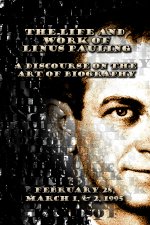Videos: Session 2: The Biographer's Picture of Linus Pauling
Session Introduction: “The Biographer's Picture of Linus Pauling.”
Fred Horne (Chemistry, Oregon State University)
7:09 - Transcript Available
Horne introduces Session II of the conference by describing the history of Linus Pauling's relationship with Oregon State University and acknowledging those responsible for organizing a conference in Pauling's honor. Horne also shares a few stories of his own personal encounters with Pauling, including a memorable trip to Iran during which Pauling urged the Shah to eliminate sugar from his diet.
“The Bootlegger's Son: Or the Stochastic Method in Biography.”
Tom Hager (Pauling biographer)
36:45 - Transcript Available
Hager discusses the processes that he utilized, and the pitfalls that he encountered, in writing his biography of Linus Pauling. He notes that, in attempting to develop a biography of a hugely-important figure, one must be cognizant of the disparities that inevitably arise between "fond memory and fact," and be aware of the gradual development of public personas that differ markedly from private habits and attitudes. In the case of Pauling, the biographer also faces a problem of information overload, due to the huge amount of primary-source material saved by Pauling over the course of his long life. In attempting to develop a clear portrait of Pauling, Hager stresses the importance of what he came to term "stochastic biography," a method of inquiry initially developed by Pauling himself, wherein the investigator attempts "to divine truth by conjecture."
“Analyzing Pauling's Personality: A Three Generational, Three Decade Project.”
Ted Goertzel (Sociology, Rutgers University)
34:56 - Transcript Available
Goertzel discusses the evolution of the Pauling biography that he co-authored with his parents over the course of three decades. The Goertzels' project relied in part on an analysis of Pauling's responses to a Rorschach test, which the authors then used to develop their thoughts on Pauling's personality. Goertzel presents the Pauling Rorschach data and the subsequent analysis that was derived, noting both the advantages and the potential flaws of this method of biographical inquiry.
“The Biographical Quest: Some Personal Reflections of a Pauling Biographer on the Art and Science of Scientific Biography.”
Robert Paradowski (Science, Technology, and Society, Rochester Institute of Technology)
59:04 - Transcript Available
Paradowski utilizes examples from both film and literature to discuss his ideas on "the problems and the potential" for authors of scientific biography. In examining Orson Welles' "Citizen Kane," Paradowski details the dangers inherent to a biographer's quest for their subject's "secret self." Likewise, Paradowski uses Akira Kurosawa's "Rashomon" to illustrate the difficulties that can be presented by differing accounts of the same events. Paradowski suggests that the modern approach to the writing of biography has typically "oscillat[ed] between the extremes of hagiography and pathography," and that a tension between the notions of "biography as art" and "biography as science" remains a core issue within the community of biographers. Paradowski concludes by discussing the specific importance of all of his talk's themes to the particular subgenre of scientific biography.
“The Biographer's Picture of Linus Pauling.”
Lily Kay (History of Science, Massachusetts Institute of Technology)
13:42 - Transcript Available
In commenting on the presentations made in Session II, Kay reflects upon her own experience of writing about Linus Pauling and certain other of molecular biology's more notable figures. Kay discusses aspects of her writing which did not necessarily cast Pauling in a favorable light, and then puzzles over Pauling's generally warm response to what she had published. From this experience, Kay finds herself in sympathy with Hager and Paradowski, who both wrestled with problems of arriving at a single "truth" derived from contradictory sources and a paper record that is often difficult to navigate.
“Boswellizing Pauling.”
Derek Davenport (Chemistry, Purdue University)
20:55 - Transcript Available
Davenport responds directly to the talks delivered by Paradowski, Hager and Goertzel. In so doing, he finds common ground with Hager's concept of "stochastic biography," though disagrees with the broadness of certain conclusions that Hager has made about Pauling's life and work. Likewise, Davenport agrees with the central tenants of Paradowski's thesis, though questions the grandeur of his approach. Goertzel's methods, however, he finds less agreeable, noting that "psycho-biographies, of scientists at least, are by nature imprecise and frequently are impertinent in both senses of the word."
Watch Other Videos
Session 1: Linus C. Pauling Day Lecture
- Ken Van Holde - Introduction of Francis Crick.
- Francis Crick - “The Impact of Linus Pauling on Molecular Biology.”
Session 2: The Biographer's Picture of Linus Pauling
- Fred Horne - Session Introduction: “The Biographer's Picture of Linus Pauling.”
- Tom Hager - “The Bootlegger's Son: Or the Stochastic Method in Biography.”
- Ted Goertzel - “Analyzing Pauling's Personality: A Three Generational, Three Decade Project.”
- Robert Paradowski - “The Biographical Quest: Some Personal Reflections of a Pauling Biographer on the Art and Science of Scientific Biography.”
- Lily Kay - “The Biographer's Picture of Linus Pauling.”
- Derek Davenport - “Boswellizing Pauling.”
Session 3: The Personal View of Linus Pauling and His Work
- Crellin Pauling - Session Introduction: “The Personal View of Linus Pauling and His Work.”
- Matthew Meselson - “Linus Pauling as an Educator.”
- Ken Hedberg - “The Human Side of Linus Pauling.”
- William Lipscomb - “Reflections.”
- David Shoemaker - “My Memories and Impressions of Linus Pauling.”
- Frank Catchpool - “Personal Reminiscences about Linus Pauling.”
Session 4: Historians and Contemporary Scientific Biography
- S.S. Schweber - “Writing the Biography of a Living Scientist: Hans Bethe.”
- Frederic L. Holmes - “Historians and Contemporary Scientific Biography.”
- Judith Goodstein - “Tales In and Out of 'Millikan's School.'”
- Robin Rider - “Manuscript Collections in the Biographical Enterprise.”
- John L. Heilbron - “Remarks on the Writing of Biography.”


